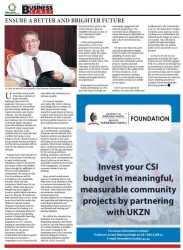
Dr Albert van Jaarsveld Vice-Chancellor of the University of KwaZulu-Natal : Ensure A Better And Brighter Future RSS Dr Albert van Jaarsveld Vice-Chancellor of the University of KwaZulu-Natal : Ensure A Better And Brighter Future2017-06-26 Universities across South Africa face a plethora of student funding challenges that need to be addressed. There are no silver bullet solutions for this problem and this funding challenge will require innovative and creative solutions. The #Feesmustfall movement that started in 2015 and continued into 2016 indicated to all in the higher education sector that education remains out of reach for many young South Africans. Moreover, it also confirmed that for many who had it within their grasp, it may remain a dream. Clearly the pay as you go system that has developed over the previous decades will not work for the majority of South Africans.
Students know that education is one of the primary tools that can be used to address past imbalances, improve the present and ensure a better and brighter future through the upliftment of the poor and marginalised communities. We cannot sit idle. If we do nothing we will be accomplices to an undesirable outcome which can only precipitate a bleak future for our country. While some may have thought that the struggle for access to quality higher education was over, the past 18 months is a stark reminder that it is not. Today we are faced with the reality that while the National Student Financial Aid Scheme (NSFAS) has increased its funding, it is simply not adequately funded to meet the needs of the growing number of financially deserving students enrolling at our institutions in 2017. General funding to universities have also declined in real terms for more than a decade. The pincer movement created by underfunded universities together with sharp fee increases to compensate for the former has left universities and students at sea, without a paddle. For research-intensive universities like UKZN, this has increasingly placed a reliance on third stream income. Being research focused means we have to compete with the best in the world and therefore we have to provide the best possible resources to our staff, students and researchers. This third stream income (made up of endowments, scholarships, donations, and investments from business, partners and alumni) is therefore critical for the future well-being of our universities and students. Third stream funding, or direct societal investment, has the potential to fill the gap left behind by the current government funding challenges experienced across the sector. Government has done a lot but we do not have a sustainable solution by any stretch of the imagination. The present economic climate is also not assisting. These societal contributions assist us in ensuring that we can help some of our students to learn in conducive environments that will produce productive members of society. These funds also make an enormous contribution towards improving accommodation on our campuses and upgrading and improving our technological platforms and maintaining critical resources in our libraries and teaching and learning facilities. The call for free education has prompted us to intensify our fundraising initiatives and efforts so that we can help finance studies for as many students as possible. The UKZN Foundation, the fundraising arm of the University, has been engaged in various fundraising initiatives together with the UKZN Executive. Priority has been given to the UKZN Bursary Fund, the Disability Unit and to some of our Community Health Training Centres. At this year's graduation ceremonies, 61,3% of our graduates were women and 68% were African. This can only bode well to satisfy the urgent need for more female and African professionals in the workplace in South Africa. This also confirms that the University of KwaZulu-Natal is responsive to the needs of South African society and thus plays an active role to correct the imbalances brought about by our painful past. Being aware of societal needs means undertaking our civic duty with vigour through our community engagement and outreach programmes. The University has an obligation to ensure that projects undertaken in communities are sustainable long after UKZN's involvement has ended. We have more than 350 active outreach programmes ranging from HIV and AIDS projects and upskilling of Science and Mathematics teachers to food security and community tourism projects. Students and staff undertake these projects to ensure that we improve the quality of life for those around us. As an engaged institution, turning a blind eye to the underdeveloped communities around us is simply not an option. UKZN does not operate in isolation, but functions within and is influenced by the communities it serves. We realise that to Inspire Greatness as our purpose, means reaching out to communities and influencing the change we want to see in them. This will only be possible through meaningful partnerships with our alumni, public sector and private sector partners. As UKZN, we rely on your generosity to facilitate the many projects we are currently engaged with. It is common knowledge that an investment in education yields the best results for communities and society at large, and we would like to invite you to partner with UKZN and invest in our collective future. Inspiring greatness is trumped only by ensuring and delivering greatness. |
Dr Albert van Jaarsveld Vice-Chancellor of the University of KwaZulu-Natal : Ensure A Better And Brighter Future
Copyright © 2025 KwaZulu-Natal Top Business